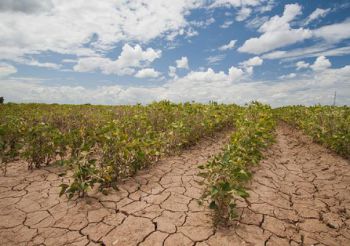Climate change will only affect the economic growth of the poorest nations
By: Neil Vowles
Last updated: Friday, 7 September 2018

New research by Prof Richard Tol warns that climate change will only affect the economic growth of the poorest nations.
Climate change looks set to slow productivity only in the world’s poorest nations, according to new research from University of Sussex and La Sapienza economists.
The research, published in Environmental and Resource Economics, warns that the world’s 100 poorest countries will be 5% worse off by the end of the century than they would have been without climate change – wiping trillions of dollars from the global economy every year.
The study by Professor Richard Tol and Dr Marco Letta reveals that climate change’s impact on productivity would decelerate, but not reverse, economic growth.
Even this small change is likely to put the poorest countries, particularly those with the hottest climates, at a further disadvantage with the report’s authors calling on global leaders to develop policies to tackle climate change and poverty reduction simultaneously.
Professor Tol, professor of economics at the University of Sussex, said: “The concern is that climate change will only widen the gulf of inequality between rich and poorer countries around the world in the upcoming decades. World leaders need to understand this risk and work towards minimising it before the full impact of climate change is felt by the world’s poorest nations. For example, emission reduction policies that harm economic growth in poor countries, by restricting access to cheap sources of energy, should be avoided.”
A number of previous studies have predicted that climate change might impact productivity growth, a major factor in long-run economic growth across the globe.
Using newly developed data on total productivity growth, Dr Letta and Professor Tol examined the relationship between productivity growth rates and annual temperature shocks based on climate data from 60 countries between 1960 and 2006.
Poorer countries are likely to see their economic growth slowed by climate change because they have a much larger share of their GDP in the agricultural sector, have an industry featuring much more outdoor work and with lower capacity to adapt to rising temperatures.
The study also shows that countries with hot climates have to have considerably stronger economies, around three times larger, to be in a position to ride the impact of climate change with significant temperature rises than countries in a naturally colder climate.
While the data suggests the effect of temperature increase upon productivity is a relatively small one, this is based on the effects of short temperature ‘shocks’ in certain years, over the course of decades.
But climate change by definition would be a permanent overall increase in temperature in these countries, and so the actual effects of climate change on economic growth could be far more pronounced than the current data suggests.
The research modelling also cannot account for the impact of more severe climate change scenarios, such as a substantial sea level rise, a slowdown of the movement of seawater, or the release of methane from melting permafrost.
All of these factors could make the impact of climate change more pronounced then the research suggests and harm productivity growth more severely in poorer nations.
Professor Tol believes that the research shows that more work needs to be done to marry policies that aim to tackle climate change, and aim to alleviate poverty, to better combat the effect of one on the other.
He said: “Our analysis suggests that weather shocks affect economic growth through a reduction in productivity only when coupled with poverty; it doesn’t show that climate change will harm all future economic growth by affecting technological progress, as hypothesized in some literature. Given the importance of total productivity growth for long-run development, our paper raises concerns over the inequality of future climate impacts, and calls for policy makers to consider poverty reduction as a crucial element of climate policy in future.”
To read the paper in full visit here.
